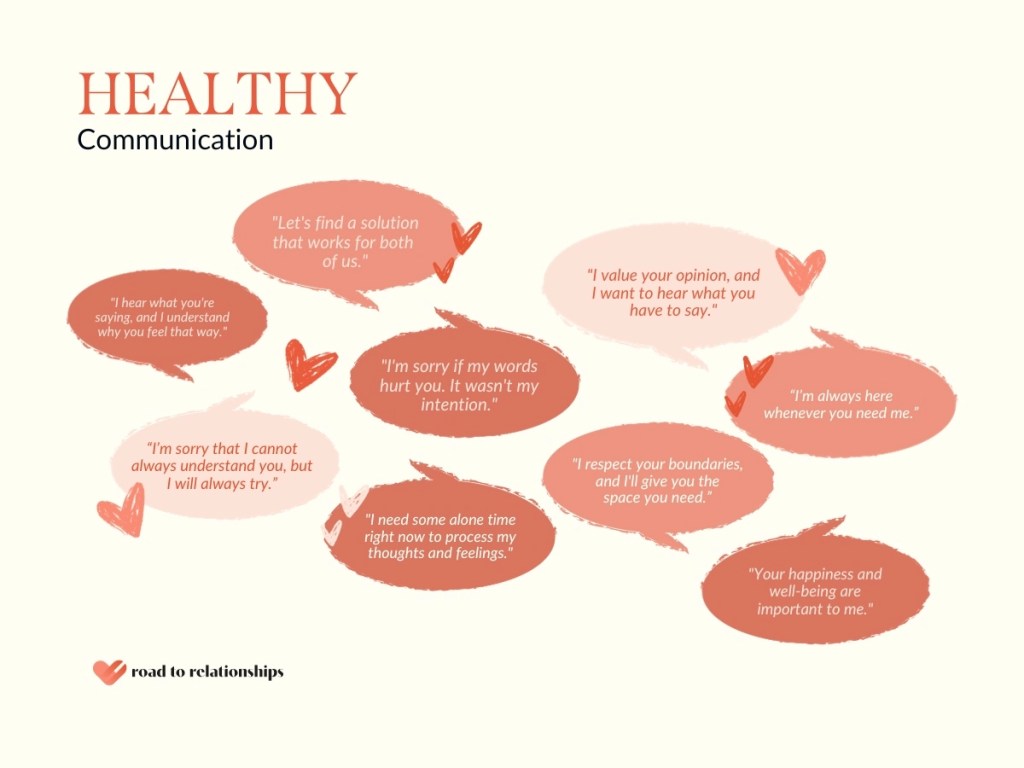Mastering the art of communicating in relationships is a cornerstone for any successful relationship. Effective communication serves as the bridge that connects hearts, minds, and aspirations, nurturing a profound understanding between partners.
Whether you’re starting a new relationship or looking to strengthen an existing one, mastering the complexities of interpersonal communication is critical.
This article offers communication insights and advice that will change how you relate to your significant other.
Why Communication in Relationships is Important
Relationships collapse when couples do not communicate with one another. Sorry for breaking the terrible news so soon, but someone has to.
The human physique is not uniform. Each of us has our own beliefs, tastes, and goals. As a result, we now have a different viewpoint. Remember that the other person in your relationship has a distinct point of view.
Consequently, developing your communication skills with your spouse is the essential thing you can do for your marriage. Just excuse me, but could you please clarify “communication” for me?
Don’t we chat and share our thoughts with each other? And doesn’t the fact that I feel I can do it make me a great communicator? No, not really.
Communication is not as simple as we make it out to be. And the more eager we are to improve our communication abilities, the more our relationships will strengthen. It takes talent to be able to communicate your views and ideas successfully.
Communication is an art form, and we must ensure that the person we are attempting to reach knows what we are saying or doing.
A large majority of effective communication includes empathy. Learn more about how empathy can improve your relationships.
Our words and actions are vital but not the only means of communication. It also includes how we interpret the words and actions of others. “Couples who don’t communicate may get into the sad cycle of simply existing together and never truly getting to know one another,” says Board Certified Coach Marcelina Hardy, MSEd, BCC. You can’t expect your relationship to grow to tremendous depths if you don’t communicate with each other frequently and frankly. The issue then arises: What can be done to improve communication?
Building a Healthy Relationship

Perfecting skills like nonverbal communication (e.g., body language and facial expressions) and verbal communication (e.g., tone of voice) is imperative for effective communication in relationships. A slight adjustment in the tone of voice can already make a productive conversation smoother. If you want to connect with your partner on a deeper level and have intimate relationships with your peers, you should practice these things from time to time. This article will give you actionable tips towards healthy communication in relationships, disbanding poor communication skills from your life.
10 Tips For Communicating in Relationships
1. Active Listening
When your partner is speaking, give them your undivided attention. It’s not just about hearing the words; it’s about showing them they matter. Put down the distractions, make eye contact, and let them know you’re truly present. Active listening fosters a sense of being valued and understood.
2. Engage in Open and Honest Communication
Be open and honest about your feelings. Sharing what’s on your mind fosters trust and understanding. Imagine you’re sharing your inner thoughts with your best friend—no filter needed.
3. Use “I” Statements
When discussing sensitive topics, use “I” statements to convey your emotions and thoughts without sounding accusatory. For example, say “I feel hurt when…” instead of “You always do…” This keeps the conversation about your feelings, not blame.

4. Practice Empathy
Learn to put yourself in your partner’s shoes to understand their emotions and experiences. Empathizing shows that you care about their feelings and helps bridge gaps in understanding. Empathy is like a superpower that helps you connect on a deeper level.
5. Pay Attention To Non-Verbal Communication
Pay attention to body language, facial expressions, and gestures. Sometimes, what’s not said speaks volumes. Non-verbal cues can help you better interpret your partner’s emotions.
6. Timing is Important
Choosing the right time and place for serious conversations is very important. Avoid discussing sensitive issues when one or both of you are stressed or distracted. Instead, wait for a cozy, comfy time when you can both focus.
7. Stay Calm During Conflicts
Inevitable disagreements are a part of any relationship. When such moments arise, learn to maintain a composed demeanor and refrain from raising your voice or resorting to hurtful language. No raised voices or finger-pointing. Imagine you’re having a chat over coffee with your favorite person—because you are!
8. Avoid Blame and Criticism
When talking about an issue, avoid criticism. Focus on the specific behavior or situation that’s bothering you. This helps prevent defensive reactions and keeps the conversation constructive. Instead of saying “You never listen,” go for “I’d love it if we could chat more.” Positive vibes all around.
9. Celebrate the Little Things
Regularly express gratitude and appreciation for your partner. Express gratitude for all those little things your partner does. It’s like saying, “Thanks for making me smile today,” and watching their face light up. Recognizing their efforts and qualities strengthens the emotional connection between both of you.
10. Talk About Boundaries
Couples should talk about boundaries in the relationship. It’s like creating a safe space where both of you can be yourselves without worry. Clearly communicate your personal boundaries and respect your partner’s as well. Boundaries help enhance the overall quality of communication.
Making a Connection in a Conversation
Most people feel that constant communication is all that is necessary to be considered an excellent communicator. Regrettably, this is not the case. All forms of communication create a two-way flow of information between two or more individuals, written, physical, or verbal.
A meaningful conversation does not need idle chit-chat. Paying attention to the other person’s words and trying to understand what they mean is vital. In a long-term relationship, just as the early thrill of a new relationship can fade, so can the depth of your feelings for your partner and your connection with them. It’s also OK to be open about how your relationship with your spouse has evolved.
Maintaining eye contact, summarizing what you are hearing, and then asking questions about what has been said are ways to ensure you have meaningful connections during conversations. When these elements are missing, you lose out on opportunities to make deeper connections that will improve your relationship. Deep listening builds trust and safety in relationships, according to The Project Development Group.
It is best to refrain from accusatory language under challenging conversations and use positive communication patterns in those heated moments. Positive emotions can significantly impact the way that married couples interact with each other in difficult conversations.
At the very least, you are aware of the gap and can take action to close it. Finding the missing connection is the first step toward improved communication within your relationship.
Adopt an Approach that Emphasizes Openness and Transparency

There is no way to improve communication if honesty and openness are not already present in the relationship. Dr. Lisa Firestone on Pschyalive explains that “our ability to be open and truthful with a partner is a sign of trust and security in the relationship. Feeling comfortable to disclose something vulnerable or meaningful about ourselves is indicative of the relationship’s strength, arguably even more significant than an inadvertent or little white lie here and there.”
Being accurate is being open and vulnerable with your partner about how you truly feel, and being frank about who you are and what you want from a relationship is vital. When a partnership is too complex, some people shut down honesty in their communication to protect themselves.
When difficulties are avoided rather than acknowledged, communication in a partnership suffers. Please don’t do this unless you genuinely want to prevent an explosive outburst in which you could say or do something you’ll later regret.
Running away may seem the most excellent option when you don’t want to deal with anything. It simply means that a linguistic barrier must be overcome. You should be able to trust your spouse enough to know that they will listen to you and respect you even if you bring up a sensitive subject. In all honesty, your partner should feel the same way about addressing difficulties with you.
You should not repress your sentiments just because your lover wants you to. The solution is just temporary and will be abandoned ultimately. Rather than avoiding disagreement, couples should practice an open conversation about their emotions.
Spending quality time with your partner is the first step in getting to know them. Relationships need a lot of time and work, so spend time with your partner regularly. Though you want to communicate effectively with your partner, they must feel they have your complete attention.
Even if this isn’t something you frequently do, you may learn to focus thoughtfully on your partner. Although practicing mindfulness is difficult, it offers several benefits. Remember that building love, trust, and intimacy in a relationship takes time and that quitting before you attain your goal may mean missing out on the profound connection and intimacy that comes with effective communication.
The Importance of Understanding Your Personal Communication Preferences
The first step in enhancing your relationship’s communication is recognizing you and your partner’s communication preferences. As previously established, various people view things in different ways. Since then, our ways of interacting with one another have developed. While some people prefer to take the initiative, others prefer to sit back and observe.
Passive people struggle to express themselves verbally. Aggressive people are heard, but they don’t converse with anyone. Some people are more likely to use sarcasm while speaking to others, which may give the appearance that they aren’t yet comfortable doing so, which may be deceptive.
On the other hand, those who can communicate assertively have a clear sense of what they want from their relationships and aren’t scared to ask for it. Not only do we differ in how we express things to one another, but also in how we process and react to information. It makes no difference how well you understand and utilize your communication style if you don’t understand and use your partner’s.
Recognizing that you and your partner have different communication styles is essential to enhancing your relationship. You may be an outspoken speaker, while your spouse may be quieter. Finally, you two don’t appear to get along since, while one of you is strong at expressing yourself, the other struggles.
Find out what communication methods work best for your marriage. Is it more typical for them to use your name or touch you to grab your attention? When you try to explain anything to them, do they understand? It would be best if you concentrated on these aspects of communication.
Test your Ability to Listen Attentively
Everyone wants to be heard; it’s true. Does it ever occur to us that our partners want the same thing from us? You don’t have to open yourself entirely to your discussion partner just because you’re practicing active listening.
Understanding what the other person is saying includes adopting a welcoming stance, making direct eye contact, and paying close attention to both their words and nonverbal cues. When you understand the concept of active listening, you’ll realize that it’s more important to listen to thoroughly understand the speaker’s point of view before developing a response.
As a result of your attentiveness, your spouse may feel more at ease opening up to you, resulting in a more meaningful relationship between you.
Make no Assumptions

A person’s emotional condition may frequently be determined by looking at them. However, our assumptions and conclusions are not always accurate. Your partner isn’t a mind reader, so don’t expect to know what they’re thinking or feeling constantly.
Shirley Taylor, a keynote speaker and communication coach explains that one of the reasons we make assumptions is because we think we know what the other person is going to say; hence we tend to jump in and complete a sentence or idea during those pauses.
Instead of assuming your partner’s words, emotions, or ideas, ask them. You can’t tell your lover you’re OK while yet being cruel. Please give them the whole truth. Otherwise, people will make incorrect judgments based on your silence.
You must give each other permission to be vulnerable if you want to feel secure talking about your feelings and thoughts with your partner. Instead of suppressing your emotions and hoping they will go away, it is preferable if you and your spouse can discuss them before they escalate.
Sure, some couples are so in sync that they can finish each other’s sentences. To get to this point, you must first build a firm foundation of mutual trust and intimacy in your relationship. According to Dr. Michele Kerulis, successful couples who can communicate successfully allow each other to express their aspirations and wants. It’s an excellent approach for couples to strengthen communication, solve conflicts, and deepen their love for one another.


